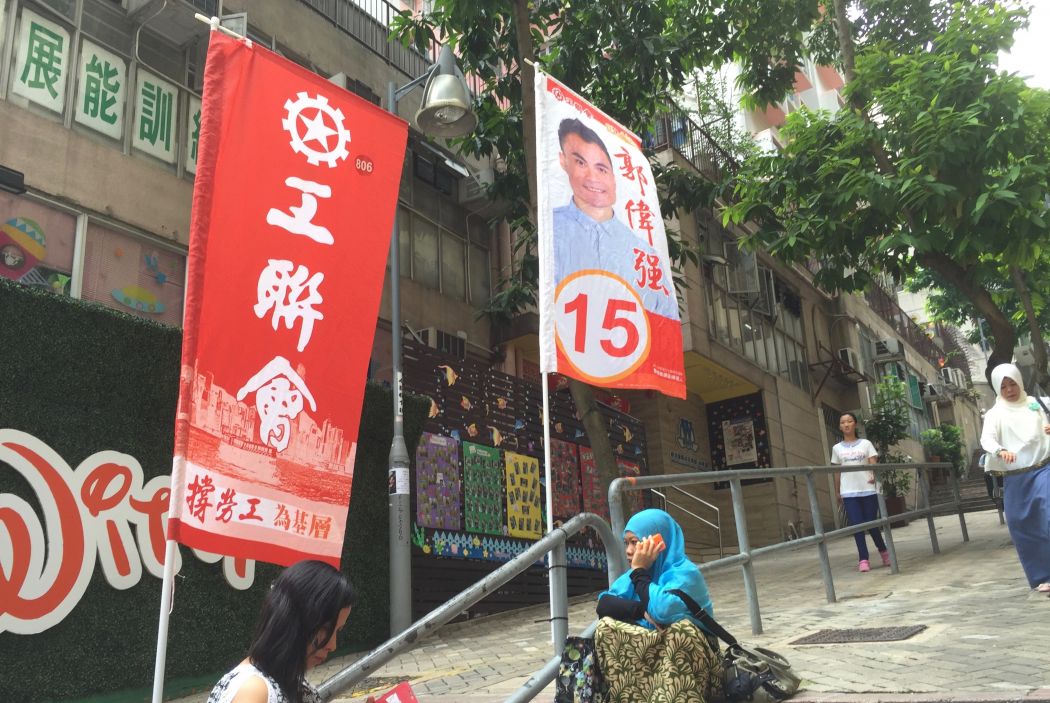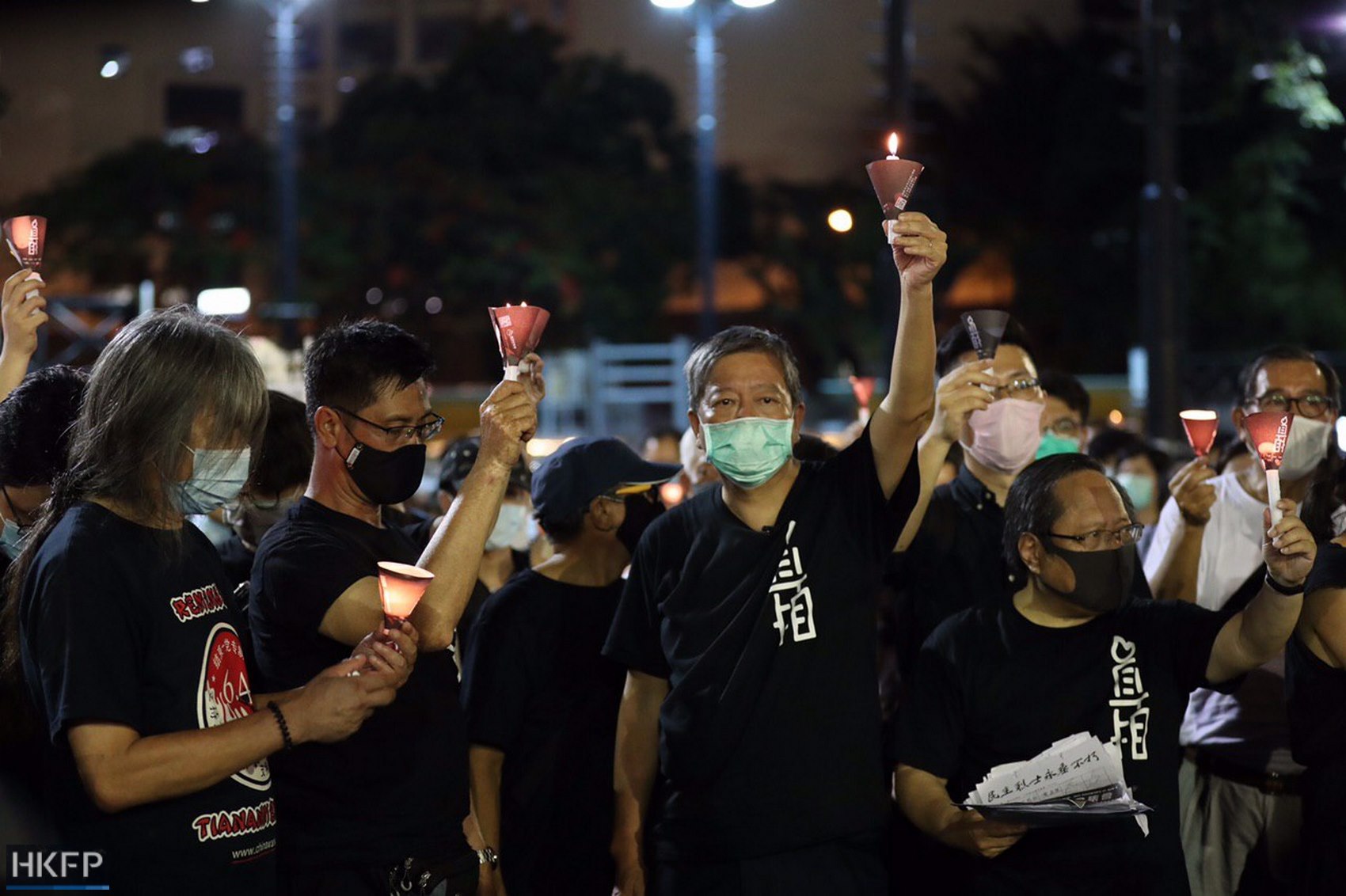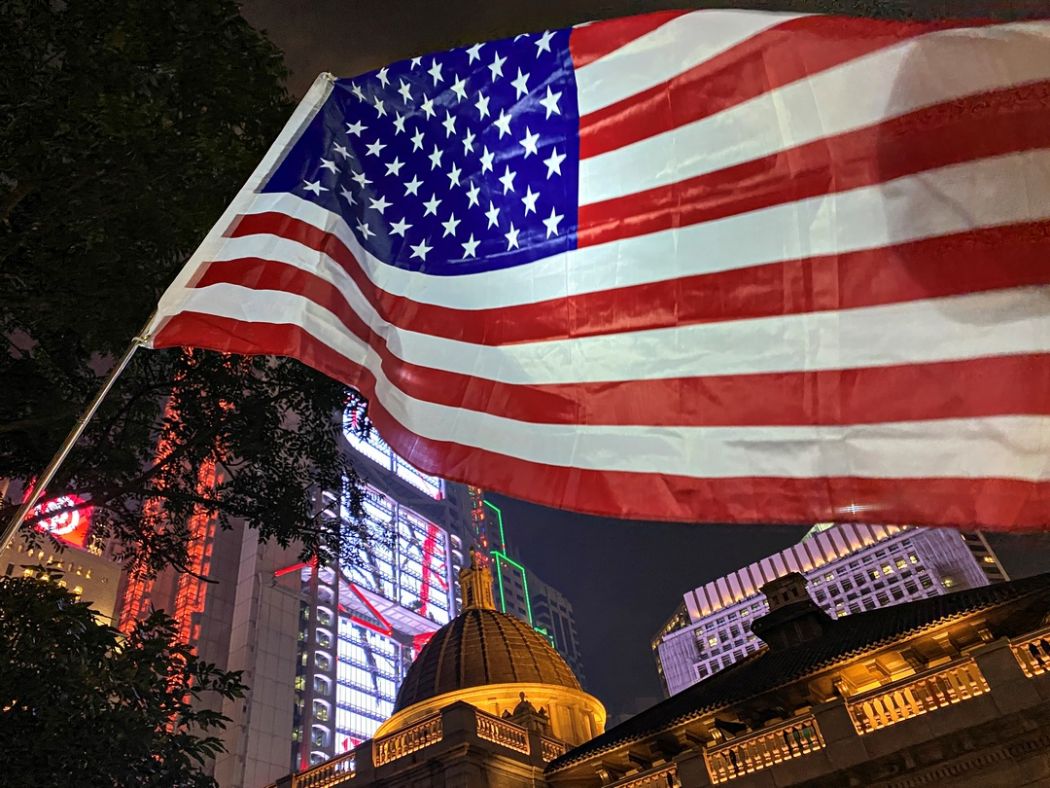Expressions of shock and dismay flew through cyberspace after Lee Yee, one of Apple Daily’s favourite columnists, published an opinion piece proclaiming his preference for United States President Donald Trump, who at the time was campaigning for a second term.
Apple Daily’s owner, Jimmy Lai, also declared himself unequivocally for Trump, saying that his dealings with China had been effective and that they had a direct positive impact on Hong Kong.

Lai is currently under indictment, charged with multiple crimes including some alleged violations of Hong Kong’s new National Security Law. But for now, his media organisation is carrying on as usual in its role as standard-bearer for Hong Kong’s democracy movement.
Trump failed in his bid for a second term but the controversy lingers on, created by the seeming contradiction. Hong Kong’s civil rights struggle against Chinese oppression has won widespread international sympathy. Donald Trump made himself one of the most divisive presidents in US history and, among other things, is held responsible in the court of public opinion for violating some of those same civil liberties.
Hong Kong pro-democracy partisans nevertheless doubled down on their preferences. President Trump and his Republican Party, they trusted. Democrat Joe Biden and his party, they did not. The contradiction also goes deeper than support for Trump and extends back further than his 2020 re-election campaign.
Why no social justice dimension?
Hong Kong’s pro-democracy protest movement found itself suddenly in the international spotlight a year ago, during the anti-extradition law protests. The 79-day occupation of major city thoroughfares had received its share of attention five years earlier. But the massive street demonstrations beginning in June last year signalled a deeper level of dissent than the peaceful civil disobedience street blockades of 2014.

That 2014 protest campaign had evolved from Benny Tai’s Occupy Central idea into the Umbrella-Occupy Movement and served an important consciousness-raising function – but nothing more.
It had no success in blocking or reversing the central government’s growing intrusions into the autonomous political space that Hongkongers thought they had been promised after the 1997 return to Chinese rule.
Occupy proved to be a watershed experience for Hong Kong pro-democracy protesters. But it had no effect on the main bone of contention at that time, namely, universal suffrage elections. After decades of agitation extending back to colonial days, the 2014 campaign was launched in anticipation of the first window of opportunity which Beijing’s vague timetables seemed to offer: the election of Hong Kong’s Chief Executive in 2017.
The effort ultimately failed after Beijing finally revealed, in 2014-15, that its definition of a universal suffrage election was one where “one-person, one-vote” was used to endorse Beijing’s approved choices, with no other candidates allowed to compete.
The peaceful civil disobedience phase of Hong Kong’s post-1997 protest movement ended on July 1, 2019, with the storming of Hong Kong’s Legislative Council building. That insurrectionary act signalled a much deeper level of dissent and Hong Kong’s struggle suddenly became international news, catching imagination on both the left and the right.
But some on the left flew in and then out again just as quickly, after searching in vain for the social and economic dimensions of a movement that seemed to have none. They were looking for something more fundamental than simple demands for universal suffrage and relief from Beijing’s interventions. Where were the concerns about inequality, poverty, working class wages, affordable housing?

Good questions. But the visitors logged in and out too quickly. Those concerns have long since been subsumed within the struggle for universal suffrage elections and resistance to Beijing’s heavy hand.
This follows from Hong Kong’s distorted way of political life, inherited from an unreformed colonial past and perpetuated for Beijing’s post-1997 convenience. Beijing not only dominates the labour scene but has also created an effective alliance with pro-establishment forces.
These include the city’s tycoons and property developers, who time their projects to maximise returns on the housing market. Government policies include the practice of managing land sales, which are a major source of public revenue. Hence the trade-off: a stable economy based on low taxes and sky-high housing costs.
Organised labour is dominated by the pro-Beijing Federation of Trade Unions, which currently claims an affiliated union membership of over 400,000, including both blue and white collar workers. The FTU, organized in the late 1940s, was leftist even before there was a communist China.
Ties to the local community also run deep, created through years of providing basic social services, as well as solidarity in a city otherwise hostile to pro-Beijing loyalists and hostile to the Communist revolution from which much of the population had fled.
The FTU’s services included schools and clinics, appreciated by those who needed them most. That was especially the case in the 1950s and 1960s, before the colonial government saw fit to begin providing such services.

The FTU has also provided a loyal source of campaigners and voters for pro-Beijing candidates since universal suffrage elections – for neighbourhood councils – were introduced in the 1980s.
Labour is now represented in the 70-seat Legislative Council (LegCo), both by directly elected legislators from Geographical Constituencies, and by three indirectly elected Functional Constituency legislators. The three seats are reserved for trade union representation.
The council has 40 directly elected seats, and 30 indirectly elected Functional Constituency representatives.
A pro-democracy Confederation of Trade Unions was set up in 1990 and currently claims about 160,000 affiliated union members. But due to its smaller size, the CTU cannot compete with the FTU for the three reserved labour seats. Voting within the Labor Functional Constituency is done in the form of one vote for each of the affiliated unions. Thus, the CTU has far fewer votes.
An Election Committee formally endorses Beijing’s choices for Hong Kong’s Chief Executives. This committee is arranged in the same way as the LegCo seats, based on the same Functional Constituency representation.
Towards the end of 2019, a new white-collar union movement sprang up with the aim of supporting strikes by protesters. Another aim was to increase union participation in the September 2020 Legislative Council election and the 2022 Election Committee choice for a new Chief Executive.

The September election was postponed, ostensibly due to the pandemic. Meanwhile, the new National Security Law is being implemented to target individuals guilty of offences such as those committed by the new unions’ strike organisers, although none have yet been charged.
It is this convoluted electoral system, decreed and maintained by Beijing, that has inspired Hong Kong’s long-running drive for universal suffrage elections. The goals of realistic political representation and greater socio-economic justice are integral to the demands for universal suffrage elections and resistance to Beijing’s heavy hand.
Why American-style liberal democracy?
During an interview with The Nation a few months ago, Hong Kong activist Jeffrey Ngo was asked the same question in a different way. He was a member of Joshua Wong’s Demosisto political party, which was hastily disbanded on the night of June 30 just as the National Security Law was being promulgated in Beijing.
The interviewer expressed concern that Demosisto had essentially put all its eggs in the same American basket. Why take sides, and have you taken the best side? You might even be helping to provoke a new Cold War, this time between China and the ever-warlike United States.

Jeffrey Ngo is now a doctoral student of history at Georgetown University in the US and has been working the American end, helping Joshua Wong and other Hong Kong activists to negotiate the unfamiliar lobbying routines in Washington. These efforts ultimately won bipartisan support in the wake of last year’s protests and helped produce the Hong Kong Human Rights and Democracy Act.
Lobbying continued until President Trump signed the legislation into law, and afterwards as well, urging that it be used to sanction Hong Kong officials. This too was done, although they didn’t seem to mind having their American bank accounts frozen for the duration.
In years past, Hong Kong activists liked to argue that they knew their efforts alone were unlikely to sway Beijing decision-makers. Hence the importance of reaching out to the international community for help in pressuring Beijing on behalf of Hong Kong’s demands.
Beijing is always keen to portray itself in a positive light. So the disapproval of others might help Hong Kong’s cause.
Benny Tai, now an ex-professor of the University of Hong Kong law school, is still of the same view. The 2014 Occupy Central campaign was originally his idea and he was subsequently fired for political conduct unbecoming a university professor – although not until just recently, after the National Security Law came into force.

He is now expressing satisfaction that Hong Kongers have finally succeeded in alerting the international community to Hong Kong’s struggle. He still hopes that the international pressure now being imposed on Beijing will eventually make a difference. At least in this respect, he says, Hong Kong campaigners have done what they needed to do.
This was also the logic inspiring countless overseas journeys undertaken by Martin Lee and others before and after 1997. Civic Party leader Alan Leong made the rounds in Washington a few years ago.
But the results were always the same: indifference. Hong Kong is too small a place, too far removed from other countries’ concerns, a complication in relations with Beijing, and so on.
More recently, but before Hong Kong’s 2019 insurgency won international sympathy, the most high-profile names associated with the Hong Kong cause in Washington were hardliners like Senators Marco Rubio and Tom Cotton.
During his The Nation interview, Jeffrey Ngo was thus confronted with the question: how could they be satisfied with such a result? How could he and his friends hope the US would be a force for good on Hong Kong’s behalf with such “villains” as their champions? Joshua Wong is already being caricatured as an enemy in America’s struggle for racial justice.

Jeffrey Ngo said he doubted Washington would go to war with Beijing over Hong Kong. He was thinking instead about values and the difference individuals could make or not in their choice of direction. Hongkongers, through no fault or choice of their own, were now being forced against their will to accept Beijing’s values.
“But when I think about what values Hong Kong should represent, those values are far more likely to flourish in a country like America than they are in China.” So that if the choice is between the order being imposed by China right now, on a daily basis, and the present “flawed order led by the US”, he would opt for the latter. Correcting the flaws in an American-led international order is a long-term undertaking. The threat to Hong Kong is happening right now.
Why Donald Trump?
Lee Yee and Jimmy Lai stood in the front rank of Trump’s Hong Kong champions. Apple Daily’s new English app makes their opinions instantly available to the international audience and the reaction was equally instantaneous.
Now in his 80s, Lee Yee began his political life not as a fighter for individual rights and freedoms, but as a pro-Beijing leftist. That phase of his life ended when he became one of several journalists working for Hong Kong’s pro-Beijing publications who broke with their past.
Perhaps like many others in China, their views had already begun changing in the 1980s, when national leaders seemed to be entertaining some new uncharacteristically liberal ideas about political reform.

That period of experimentation in the 1980s ended with the occupation of Beijing’s Tiananmen Square, and the military crackdown that cleared away the occupiers on June 4, 1989. Lee Yee was among those who turned away and never looked back.
He became an opinion writer for Hong Kong’s one remaining anti-communist news organisation and a staunch champion of its pro-democracy concerns. That forced him to take sides in the US election – as an observer with a Hong Kong cause – and he did not hesitate. He cited many reasons for his choice of Trump over Biden.
In the September 7 column that caused such an outcry, Lee recalled his earlier life. He had adhered to the standard Beijing line that there are no differences between partisan adversaries in the American political system, since they’re all capitalists and all adhere to the US constitution.
Since then he had learned to differentiate between and among American politicians and he had no difficulty choosing Trump over Biden. It wasn’t capitalism or the constitution he was concerned about, but what the candidates had to say about China and Hong Kong and how they said it, and the history of the two political parties behind them.
He expressed some views that would have been even more controversial in decades past, about America’s old “who lost China to the Reds?” controversy and what he regarded as policies of appeasement – mostly from Democratic administrations in the US: Jimmy Carter on Taiwan, Bill Clinton on China’s entry into the World Trade Organisation. Others have cited Barack Obama in this respect as well.

By contrast, Trump was not bothered about considerations of political correctness. He said what he meant and did what he said, and such a person was far more likely than others to support Hong Kong’s disruptive demands for the autonomy it thought it had been promised.
On September 9, Lee responded to the blasts he had received from his fans, asking how he could champion a racist xenophobe with dictatorial instincts. He was unfazed. The rhetorical wars he must have fought in his younger days were far worse. America’s constitution stood as the guardian against dictatorship, he replied, and its multicultural society was doing the same against white supremacy.
And why not call a spade a spade? The Chinese virus did originate in China. In the battle between freedom and equality, when political correctness overrides press freedom, that standard disappears.
Still later he cited the YouGov presidential preference poll from Britain that showed all the main European countries preferring Biden to Trump. In fact, only Taiwan preferred Trump: 42 per cent to 30 per cent of those polled. Hong Kong was Trump’s second-best support base but overall, Biden was still preferred in the Hong Kong sample: 42 per cent to 36 per cent.
Lee agreed that the figure was probably correct for the population as a whole, although some of his readers thought otherwise. For them, as for Taiwan, the immediate threat posed by China’s overpowering presence was the main concern.

That was true for Jimmy Lai as well. Trump had already taken measures to provide Hong Kong with a stronger sense of security, he wrote. Biden had made many promises along the way but had yet to articulate how future actions would be any different from past practices.
Most recently, since Biden was declared the winner, there have been suggestions of pledges to roll back all of Trump’s initiatives and target the people who helped him. Considering their vocal support in that respect, Apple Daily and its readers are waiting to see how Hong Kong fares in the rollback and whether they must now defend themselves along a new front in the wider balance of US-China relations.
Support HKFP | Policies & Ethics | Error/typo? | Contact Us | Newsletter | Transparency & Annual Report | Apps
| HKFP is an impartial platform & does not necessarily share the views of opinion writers or advertisers. HKFP presents a diversity of views & regularly invites figures across the political spectrum to write for us. Press freedom is guaranteed under the Basic Law, security law, Bill of Rights and Chinese constitution. Opinion pieces aim to point out errors or defects in the government, law or policies, or aim to suggest ideas or alterations via legal means without an intention of hatred, discontent or hostility against the authorities or other communities. |
Help safeguard press freedom & keep HKFP free for all readers by supporting our team

More HKFP OPINION:
HKFP has an impartial stance, transparent funding, and balanced coverage guided by an Ethics Code and Corrections Policy.
Support press freedom & help us surpass 1,000 monthly Patrons: 100% independent, governed by an ethics code & not-for-profit.










